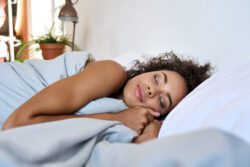Sleep apnea is a common sleep problem that occurs when the soft tissues or tongue block the airway. During periods of sleep apnea, people experience pauses in their breathing. Sleep apnea can create health problems over time, not to mention restless sleep. Our dental office provides sleep apnea treatment in Chesapeake, VA, and helps patients address symptoms like snoring and insomnia. We welcome patients to discover more about sleep apnea with answers to commonly asked questions.

Q&A: Sleep Apnea in Chesapeake, VA
Read answers to common questions that patients have about sleep apnea and their options for sleep apnea treatment:
How do I know if I have sleep apnea?
There are many common indicators of sleep apnea:
- Chronic snoring
- Mood swings and irritability
- Insomnia
- Morning headaches and migraines
- Gasping for air during sleep
- Waking up with dry mouth
If you wake up finding it hard to breathe or catch your breath, please get in touch with us for a diagnosis. We work with medical specialists to determine the right treatment for you.
What are sleep apnea risk factors?
There are multiple risk factors that can increase your chance of developing sleep apnea. If you are over 40, male, or overweight, you may be more likely to develop problems like sleep apnea. Other sleep apnea risk factors include tobacco use, which increases inflammation and fluid retention in the airway. Alcohol or sedatives also relax the throat, creating a more narrow airway.
How is sleep apnea connected to your heart health?
Continuous periods of sleep apnea lower your blood oxygen, putting strain on the heart over time. Patients who have moderate to severe sleep apnea are more prone to developing problems like irregular heartbeats, heart attacks, or strokes. Sleep apnea can also impact cholesterol levels, blood sugar, and blood pressure, which can lead to heart disease.
What are the problems associated with sleep apnea?
In addition to heart health, sleep apnea can impact other aspects of life. Fatigue during the daytime can impact school and work, making it hard to focus on tasks. Sleep apnea can also increase insulin resistance for patients with type 2 diabetes. Obstructive sleep apnea can complicate surgery, as patients may encounter breathing problems under sedation. Although snoring is not always an indicator of sleep apnea, patients with sleep apnea who snore loudly can disrupt their partner and make sleeping difficult for themselves and others.
Are there alternatives to a CPAP?
Oral appliance therapy offers an alternative to a CPAP for patients with mild forms of sleep apnea. An oral appliance is similar to a nightguard because it covers teeth. Sleep apnea oral appliances move the lower jaw forward to open up the airway. These portable appliances do not make any noise and are not bulky like CPAP machines.
Do you have any more questions about sleep apnea or sleep apnea treatment? Contact Dr. William Harper today at 757.414.7227. You can also schedule a dental consultation with Dr. William Harper online.

